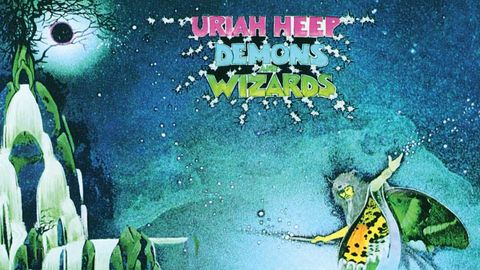It’s a cliché, but it’s probably worth repeating, and it goes something like this: back in the early 1970s, four UK bands threatened to straddle the globe as part of a fearsome, quadruple-pronged attack on pop music. Three of them — Black Sabbath, Led Zeppelin and Deep Purple — went on to do precisely that, filling arenas and kick-starting the careers of a thousand copycats. The fourth, London’s Uriah Heep, somehow disappeared into a patchouli-scented haze and were never seen again. “They’re big in Russia,” someone would say occasionally, as if to remind non‑believers that the band still existed.
The reality, of course, is somewhat different. Uriah Heep might be huge in countries that once sat behind the Iron Curtain – to this day, Bulgarian fans congregate on the Black Sea coast every July 1 to sing the quietly rousing July Morning – but they’ve never been away. Forty million album sales tells the story of a band who were the probably the proggiest in their field at one time, perhaps conveniently ignored by the rock press back home.
Looking back at Uriah Heep’s best albums – the trio comprised of Look At Yourself, Demons And Wizards, and The Magician’s Birthday, released over a period of just 13 months between November 1971 and Christmas 1972 – it’s difficult to see why anyone would be reluctant to love the band. It’s rollicking, often ferocious progressive hard rock, mercilessly driven along by Ken Hensley’s pumping organ and Mick Box’s churning guitar. Singer David Byron was Ian Gillan’s equal when it came to exploring the human voice’s more unlikely reaches, and the rest of the band could harmonise in a way that those Purps, Zeps and Sabs never did.
It isn’t perfection, by any means – Spider Woman from The Magician’s Birthday still feels like a slightly clumsy attempt to replicate the commercial success of the previous album’s Easy Livin’ – but it’s not far short. And it pulls off the trick of being firmly placed in the early 70s while sounding strangely contemporary: many of these songs could show up on the next Ghost album and you’d struggle to identify the join.
For the Heep obsessive, there’s a lot here: 40 alternative versions and mixes spread across the three albums, plus some decent sleevenotes from Joel McIver. None of the tracks detour too far from the originals, but all have been given a crisp, modern makeover. Diminishing returns play their part, but occasionally it’s noticeably effective, and the ominous intro to Rainbow Demon really benefits from the added crunch. With or without the extras, these three albums are genuinely essential.


